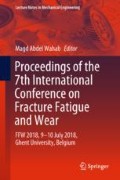Abstract
As recommended by international standards, conventional methods of determining the mechanical properties of materials require relatively large test samples. This can create difficulties when only a limited amount of material is available for testing. The small punch test is one of the techniques that can replace traditional testing methods in such conditions.
In this paper, the small punch test (SPT) was used to estimate the mechanical properties of P110 steel at low temperature. Disc samples with a diameter of 8 mm and a height of 0.8 mm were prepared and then bent, in a temperature range of −180–23 °C. The ultimate force and fracture energy increased with temperature decrease down to −115 °C. For lower temperatures, a significant reduction in those parameters was observed. Based on the fracture energy–temperature curve, the ductile-brittle transition temperature for the SPT samples was estimated (Tsp) as being around −150 °C.
The SPT results were compared with fracture surface analyses. At room temperature, the fracture surface characteristics were typical for plastic deformation regimes. Around the maximum energy peak, the fracture character changed to quasi-brittle, and then became brittle.
It was also compared the SPT results with the ductile-brittle transition temperature obtained by the conventional Charpy test. The scaling factor “α” was calculated as 0.55.
Access this chapter
Tax calculation will be finalised at checkout
Purchases are for personal use only
References
Altstadt, E., et al.: Critical evaluation of the small punch test as a screening procedure for mechanical properties. J. Nucl. Mater. 472, 186–195 (2016)
Contreras, M.A., Rodríguez, C., Belzunce, F.J., Betegón, C.: Use of the small punch test to determine the ductile-to-brittle transition temperature of structural steels. Fatigue Fract. Eng. Mater. Struct. 31(9), 727–737 (2008)
Eskner, M., Sandström, R.: Measurement of the ductile-to-brittle transition temperature in a nickel aluminide coating by a miniaturised disc bending test technique. Surf. Coat. Technol. 165(1), 71–80 (2003)
Linse, T., Kuna, M., Schuhknecht, J., Viehrig, H.W.: Usage of the small-punch-test for the characterisation of reactor vessel steels in the brittle-ductile transition region. Eng. Fract. Mech. 75(11), 3520–3533 (2008)
Kłaput, J.: Application of small punch test method in studies of the 14MoV63 steel before and after revitalisation. Arch. Metall. Mater. 60(1), 18–21 (2015)
Bulloch, J.H.: A study concerning material fracture toughness and some small punch test data for low alloy steels. Eng. Fail. Anal. 11(4), 635–653 (2004)
Turba, K., Hurst, R., Hähner, P.: Evaluation of the ductile-brittle transition temperature in the NESC-I material using small punch testing. Int. J. Press. Vessel. Pip. 111–112, 155–161 (2013)
Bulloch, J.H.: A review of the ESB small punch test data on various plant components with special emphasis on fractographic details. Eng. Fail. Anal. 9(5), 511–534 (2002)
Gizynski, M., Pakiela, Z., Chrominski, W., Kulczyk, M.: The low temperature fracture behaviour of hydrostatically extruded ultra-fine grained Armco iron. Mater. Sci. Eng. A 632, 35–42 (2015)
Shaw, N.B., Spink, G.M.: The effect of temperature, specimen size, and geometry on the fracture toughness of a 3 Pct NiCrMoV low pressure turbine disc steel. Metall. Trans. A 14(April), 751–759 (1983)
Tanguy, B., Besson, J., Piques, R., Pineau, A.: Ductile to brittle transition of an A508 steel characterized by charpy impact test part I: experimental results. Eng. Fract. Mech. 72(1), 49–72 (2005)
Romelczyk, B., Kulczyk, M., Pakiela, Z.: Microstructure and mechanical properties of fine-grained iron processed by hydroextrusion. Arch. Metall. Mater. 57(3), 883–887 (2012)
Hohenwarter, A., Pippan, R.: Anisotropic fracture behavior of ultrafine-grained iron. Mater. Sci. Eng. A 527(10–11), 2649–2656 (2010)
Bruchhausen, M., et al.: Recent developments in small punch testing: tensile properties and DBTT. Theor. Appl. Fract. Mech. 86, 2–10 (2016)
Misawa, T., Adachi, T., Saito, M., Hamaguchi, Y.: Small punch tests for evaluating ductile-brittle transition behavior of irradiated ferritic steels. J. Nucl. Mater. 150(2), 194–202 (1987)
ISO 11960:2011 - Petroleum and natural gas industries – Steel pipes for use as casting or tubing for wells. API Specification - 5CT. American Petroleum Institute Purchasing Guidelines, p. 91 (2011)
Cota, A.B., Santos, D.B.: Microstructural characterization of bainitic steel submitted to torsion testing and interrupted accelerated cooling. Mater. Charact. 44(3), 291–299 (2000)
Sekban, D.M., Aktarer, S.M., Xue, P., Ma, Z.Y., Purcek, G.: Impact toughness of friction stir processed low carbon steel used in shipbuilding. Mater. Sci. Eng. A 672, 40–48 (2016)
Lee, C.H., et al.: Microstructure and tensile and charpy impact properties of reduced activation ferritic–martensitic steel with Ti. Fusion Eng. Des. 124, 953–957 (2017)
Kameda, J., Mao, X.: Small-punch and TEM-disc testing techniques and their application to characterization of radiation damage. J. Mater. Sci. 27(4), 983–989 (1992)
Acknowledgements
The work was financed by the National Centre for Research and Development within Blue Gas II Programme, Contract No. BG2/DIOX4SHELL/14.
Author information
Authors and Affiliations
Corresponding author
Editor information
Editors and Affiliations
Rights and permissions
Copyright information
© 2019 Springer Nature Singapore Pte Ltd.
About this paper
Cite this paper
Stępniewska, M., Romelczyk-Baishya, B., Brynk, T., Giżyński, M., Pakieła, Z. (2019). Influence of Low Temperature on Mechanical Properties of Carbon Steel P110 Estimated by Means of Small Punch Test. In: Abdel Wahab, M. (eds) Proceedings of the 7th International Conference on Fracture Fatigue and Wear. FFW 2018. Lecture Notes in Mechanical Engineering. Springer, Singapore. https://doi.org/10.1007/978-981-13-0411-8_15
Download citation
DOI: https://doi.org/10.1007/978-981-13-0411-8_15
Published:
Publisher Name: Springer, Singapore
Print ISBN: 978-981-13-0410-1
Online ISBN: 978-981-13-0411-8
eBook Packages: EngineeringEngineering (R0)

